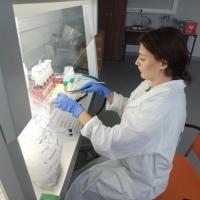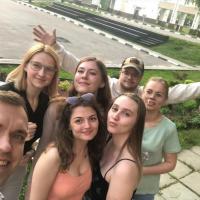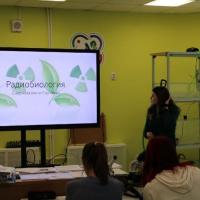The student team of the Obninsk Institute for Nuclear Power Engineering (OINPE) of the MEPhI received a bronze medal at the prestigious international competition iGEM-2021 with the project "Microbiome spacesuit: synthetic human microbiota to stimulate human protection from ionizing radiation".
iGEM Competition (https://igem.org/Main_Page) is an annual, worldwide synthetic biology event aimed at undergraduate university students, as well as high school and graduate students. The iGEM Competition gives students the opportunity to push the boundaries of synthetic biology by tackling everyday issues facing the world. Multidisciplinary teams work together to design, build, test, and measure a system of their own design using interchangeable biological parts and standard molecular biology techniques.
The MEPhI team was led by a third-year student Olesya Galanova. The team included Alina Levushkina, Anastasia Nikolaeva, Berta Valdes, Alexey Kanashtarov, Elena Goryunova, Anton Mamedov, Ivan Pavlenko, Alena Smirnova, Rimma Shatalova, Ayat Rakhimzhanov, Ksenia Kravchenko-Rapatskaya, and Sergey Sysoev.
The team was coordinated by Dmitry Sosin, associate professor of the National Research Nuclear University MEPhI, Ilya Klabukov, head of the department of regenerative medicine at the National Medical Research Center of Radiology, and a researcher at the A.F. Tsyb Medical Radiological Research Center Denis Baranovsky.
Project of the MEPhI team was aimed to create a Microbiomic Space Suit protecting cosmonauts, astronauts, and taikonauts from aggressive radiation during their long-term missions.
“Microbial communities cover the human body and form a biological suit that helps humans to perform various vital functions. The project aims to populate human's natural «suit» with gene-modified bacteria synthesizing radioprotective proteins. New microbiota will pave a way for further space exploration plans including human settlements on the Moon or an expedition to Mars”, explained students.
They were going to modify Human bacteria using silicon nanoparticles with absorbed genetic material. Inserted genes will motivate bacteria for secreting radioprotectors packed in Outer Membrane Vesicles (OMVs) capable of fusing with human cells. The bacterial communities developed within this project will be the first synthetic human microbiota engineered to perform specific functions in its natural epitopes.
The team from Obninsk competed with representatives of the Massachusetts Institute of Technology, Johns Hopkins University, Moscow State University, MIPT, and other world famous centers of bioengineering.
“This year several teams from Russia, from Moscow, Novosibirsk and Obninsk, took part in the competition. It is very important that the results of the MEPhI students' work can be used not only for long-term space exploration, but also in medicine - to protect cancer patients from developing complications during radiation therapy, ” said Ilya Klabukov.
We congratulate the students of OINPE of the MEPhI on an important achievement that sets a new benchmark for the development of the biomedical direction of the University, and we wish them new victories!








